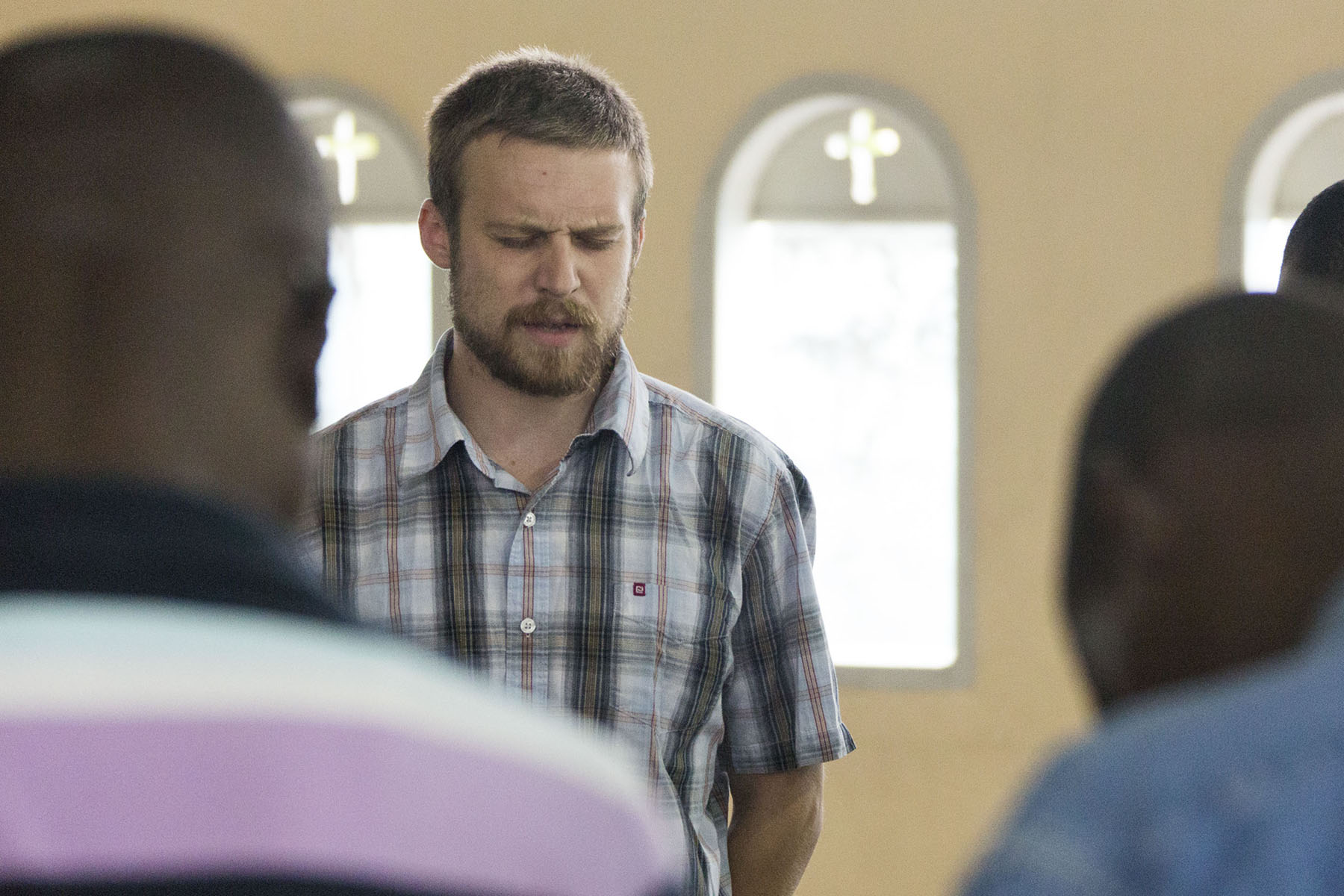
[SLIDESHOW=39186,39187,39188] EDITOR’S NOTE: This year’s Week of Prayer for International Missions in the Southern Baptist Convention is Nov. 30-Dec. 7 with the theme of “One Sacred Effort – Find your place in God’s story” from Matthew 28:19-20 (HCSB). The Lottie Moon Christmas Offering for International Missions in tandem with Cooperative Program gifts from Southern Baptist churches support approximately 4,800 international missionaries in seeking to fulfill the Great Commission. Gifts to the Lottie Moon offering are received through local Southern Baptist churches or online at imb.org/offering, where there are resources to promote the offering. This year’s goal is $175 million. Mike and Heather McAfee, the focus of this story, from Tennessee and North Carolina, are among the featured missionaries in this year’s Week of Prayer.
ABIDJAN, Ivory Coast (BP) — Dinner was a far cry from a Baptist church supper.
On this night, six members from Valley Baptist Church in Searcy, Ark., squeezed into a modest home in Abidjan, Ivory Coast, of a Muslim family breaking their Ramadan fast. The Arkansans ate by dipping their spoons into African groundnut stew and fish sauce served over attiéké, a couscous-like staple Ivorian food.
“Man, you couldna told me 10 years ago I’d be over here eatin’ with a Muslim,” Paul Yingling said with an incredulous shake of his head.
But then, you couldn’t have told Yingling and his wife Jan that God would so burden their hearts for Muslims that they would find themselves traveling to West Africa to tell about Christ.
Yingling is an auto technician in Searcy, about an hour northeast of Little Rock. The Yinglings were part of a Valley Baptist volunteer team who first journeyed to Abidjan last year to see how their church might impact a West African city far away.
Welcome shared, dinner shared
The room is cramped on this summer evening. It’s July and the hosts haven’t eaten a bite or sipped a drink since before dawn. But in a formal greeting in French, they tell the Baptists they are honored with their visit.
The small home belongs to a hospitable and dignified man named Seidou. He shares it with his immediate family along with a brother and his two wives. Seidou and his three brothers, all tall and stately, have gathered for the meal tonight. They, like many immigrants, came to Abidjan from Burkina Faso looking for work. Two of the wives, dressed in vibrantly colored traditional gowns with matching scarves around their heads, serve the men and guests and then disappear back to the “kitchen” outside the front door.
Along with typical Ivorian dishes, Seidou pours traditional drinks. The Baptist volunteers tentatively sip bissap, a sweet ruby red drink made from dried hibiscus petals, and the more adventurous sample gimgim, a beverage infused with so much fresh ginger that it delivers a spicy kick. Paul Yingling bravely drinks it down.
IMB missionaries Mike and Heather McAfee and their children, Caleb, Karis and Benjamin, are here as well, among more than 4,800 workers overseas supported by Southern Baptists’ Lottie Moon Christmas Offering and Cooperative Program.
The McAfees, friends of Seidou’s family, are urban church planters in Abidjan, the economic capital of the country. Its ever-growing population of at least 6 million reflects the diversity of West Africa: city dwellers speak 60 indigenous languages, with French as the official language, a remnant of its colonial past.
Religious practices in the city reflect the same cultural milieu; Islam, Catholicism and African tribal religions influence daily lives. Evangelicals are in the minority. Mike McAfee estimates there are about 30 small Baptist congregations in this city of millions, most with fewer than 100 members.
The McAfees wear many hats as they work with Ivorian churches and seek to establish new church plants in this sprawling metropolis. They train, they encourage and they evangelize.
They also network and thus have turned to Southern Baptist churches such as Valley Baptist to partner in their labors. On the church’s first visit, the McAfees introduced the team of five women and one man to areas of the city where they saw potential for a church plant. The team worked with translators and members of the local Treichville Baptist Church to meet neighborhood residents and engage them with Bible stories.
New territory
One morning they ventured to Attécoubé, a community to the northwest of the central business district of Abidjan. To get there they traveled up a rutted dirt road muddied by recent rains to where a Treichville church member named Mama Tra lives.
There, Mama Tra shared with them how she hoped a small plot of land she gave to the Lord could be the place for a new church. Then the team fanned out into the neighborhood to pray in homes and share Bible stories with those they met. It was the first time Paul and Jan Yingling shared their faith with a Muslim.
Later, Paul Yingling described the dynamic of joining with the Treichville church to impact Abidjan.
“The believers here … want to reach this city for Christ. They are capable of sharing the Gospel; it just kind of helps that we’re here — it kind of gets their foot in the door, you know…. They love God and even though I’m a country boy from Arkansas, we’re able to come together in one accord and share the Gospel for Christ,” Yingling says.
“We have been blessed with the fact that we have monetary resources but also the fact that we’re free to worship, we’re uninhibited, we can share the Gospel any way we want,” he reflects. “But a lot of times we sit on the pew and we don’t fulfill the Great Commission.”
Back at Seidou’s home on that summer evening before dinner was served, Yingling had walked with his dinner hosts to the neighborhood mosque so that the men of the family could pray. He sat on a bench just outside the door of the mosque and watched the ritual.
“That was saddening to see them so dedicated to doing their work and praying … and the fact that they don’t really know for sure that their sins are forgiven and where they’ll stand with God on judgment day,” Yingling recounts. “I’ve seen [Muslims] pray on TV and documentaries and things. It’s sad there, but when you actually see it firsthand and you hear the call to prayer in Arabic, it moves you like you can’t explain.”















